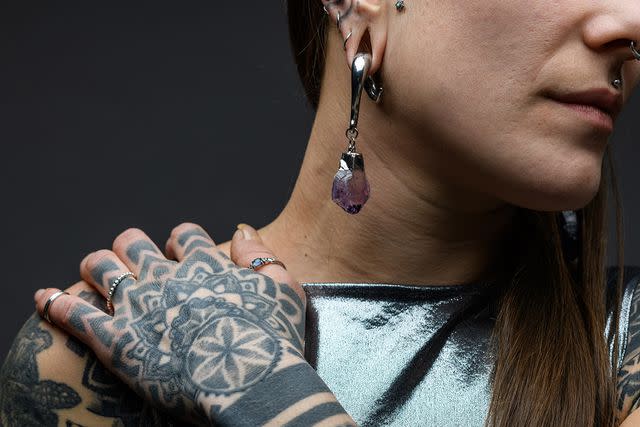Can Tattoos, Piercings Hurt Your Chances at Securing a Job? An Expert Answers
"In today's evolving work environment, the perception of tattoos and piercings has shifted significantly," workplace consultant Minda Harts tells PEOPLE

Getty
A stock image of a person with tattoosA growing number of Americans are choosing to get tattoos and piercings — but can this form of self-expression impact your job prospects?
A 2023 Pew Research Center survey found that 32% of U.S. adults have a tattoo — up from 23% in 2010 — including 22% who have more than one. The reasons people cited for getting inked include remembering or honoring someone or something (69%), making a statement about what they believe (47%), and improving their personal appearance (32%).
According to the survey, eight in 10 Americans believe society has become more accepting of people with tattoos. That attitude is carrying over into the workplace, says expert Minda Harts, a workplace consultant, speaker and author.
"In today's evolving work environment, the perception of tattoos and piercings has shifted significantly, especially following the societal changes brought about by the COVID-19 pandemic," Harts tells PEOPLE. "Many organizations now prioritize diversity and inclusion, recognizing that personal expression through body art does not inherently impact an individual’s professional capabilities or work ethic."
She says the shift is being driven in part by younger generations entering the workforce, as they tend to view tattoos and piercings more positively.

Getty
A stock image of a person with tattoos and piercingsRelated: Study Reveals Potential Health Risks Associated with Tattoos
While this is good news for today's job seekers, Harts notes that some industries still hold "traditional views on appearance," particularly those that involve a lot of client interaction or have strict dress codes. She recommends that candidates consider "the cultural- and industry-specific norms" of organizations when applying for positions.
Never miss a story — sign up for PEOPLE's free daily newsletter to stay up-to-date on the best of what PEOPLE has to offer, from celebrity news to compelling human interest stories.
When it comes to presenting yourself at job interviews, Hart says it's important to align your appearance with a company's specific culture. "For more conservative fields, consider covering tattoos and minimizing piercings, using attire such as long-sleeve shirts or blazers," she advises. "However, in creative industries, some personal expression might be welcomed."
"Always be prepared to discuss the significance of visible tattoos or piercings if asked, framing them as part of your personal authenticity and professional identity," she adds.
To gather clues about a potential employer's culture, Hart suggests doing some research first. Social media is a good place to start, she says: "Companies that celebrate individuality often showcase this on their social platforms or websites."

Getty
A stock image of a person with a tattooShe says employers can establish dress codes and appearance policies that may include specific guidelines on tattoos and piercings — provided that the policies are justified for genuine business needs such as safety, meeting health standards and maintaining a professional image. However, she stresses, these rules and policies need to be communicated clearly and applied consistently to all across the organization.
While there is no specific federal protection in the U.S. for individuals with tattoos and piercings, employers must take heed of any policies that discriminate against protected classes. "For example, employers may need to accommodate tattoos as part of religious practices," Harts tells PEOPLE.
Related: Celebrities Who Regret Their Tattoos
Ultimately, the workplace consultant says, job applicants need to consider how important it is to express themselves through their tattoos and piercings.
"If personal expression ranks high, target companies known for their inclusive cultures," she suggests. "Reflect on whether adapting to a more conservative environment aligns with your long-term career goals; sometimes, the nature of the industry might dictate stricter norms."
"Choosing environments where you feel accepted and valued will likely enhance your job satisfaction and professional growth," Harts adds.
For more People news, make sure to sign up for our newsletter!
Read the original article on People.


